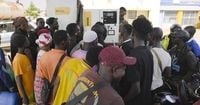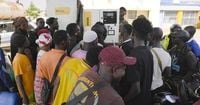Endless lines of vehicles snaked through the streets of Bamako, Mali’s bustling capital, late into the night on October 6, 2025. Gas stations, once routine pit stops for the city’s commuters, became the epicenter of a desperate search for fuel. Drivers waited for hours, clutching empty jerry cans and hoping for a few precious liters. The city’s fuel crisis, which began in early September, has only deepened, leaving residents and businesses scrambling for solutions and exposing the country’s vulnerabilities to militant violence and economic fragility.
The root of this crisis lies with Jama’at Nusrat al-Islam wal-Muslimin (JNIM), a militant group affiliated with al-Qaida. According to The Associated Press, JNIM declared a blockade on fuel imports to Bamako in early September, targeting the tankers that bring vital supplies from neighboring Senegal and Ivory Coast. Since then, the group has relentlessly attacked these tankers, effectively choking off the capital’s main fuel lifeline and plunging the city into turmoil.
For ordinary Malians, the effects are immediate and harsh. Amadou Berthé, a bank employee in Bamako, described his ordeal: “I’ve been to more than 20 gas stations and still can’t find any fuel,” he told The Associated Press, sitting on the back of a motorcycle taxi with an empty jerry can on his knees. Berthé had traveled 20 kilometers—about 12 miles—by motorcycle taxi to try to find gas for his car, which had broken down due to lack of fuel while he was returning from work. His story is far from unique; scenes of frustration and exhaustion have become commonplace as residents crisscross the city in search of fuel that often isn’t there.
Mali, despite being one of Africa’s top gold producers, remains the sixth least developed nation in the world, with nearly half its population living below the national poverty line. The current blockade has thrown a harsh spotlight on the country’s economic fragility. According to The Associated Press, the blockade is a significant setback for Mali’s military junta, which took power in 2021 with promises to improve security and stability. Instead, attacks from militants linked to al-Qaida and the Islamic State group have intensified in recent months, further undermining public confidence in the government’s ability to keep the country safe and functioning.
The blockade’s impact on the local economy is severe. Analysts warn that the crisis poses huge risks for Mali’s already fragile economic situation. Beverly Ochieng, an analyst at the Control Risks Group consulting firm, explained to The Associated Press that JNIM is using the blockade as a pressure tactic. “JNIM is using the blockade to pressure commercial operators and residents to distance themselves from the military authorities, therefore undermining the government’s legitimacy and authority,” Ochieng said. The group’s actions are part of a broader insurgency that is rapidly spreading across the Sahel, a vast semi-arid region stretching from North Africa to West Africa, where armed groups are increasingly active and deadly.
The scale of the violence is staggering. In a report released last month, the Malian Petroleum Importers Association revealed that over 100 tanker trucks had been burned and destroyed by JNIM fighters as of late September 2025. Videos circulating on social media in recent weeks appear to show truck drivers being held hostage by JNIM, calling for their release. While The Associated Press was unable to independently verify the footage, the threat is real and ever-present. According to relatives, some tanker drivers have been killed by the militants.
The violence has touched many families. Lamine Kounta, a 38-year-old Bamako resident, recounted the loss of two cousins from Ivory Coast—a driver and his apprentice—who were killed by JNIM fighters at the end of September in the Sikasso region, near the border with Ivory Coast. “They had nothing to do with this crisis or Mali. My cousins worked for an Ivorian road construction company and were in Mali to get equipment when they encountered JNIM fighters, who killed them,” Kounta told The Associated Press. The Ivorian company CIVOTECH later confirmed in a press release the deaths of two fuel tanker drivers and an apprentice driver on September 21 in the Sikasso region.
With the main fuel routes under siege, some oil importers in Mali have been forced to adapt quickly to protect their staff and businesses. One Malian fuel importer, who spoke to The Associated Press on condition of anonymity out of fear of reprisals, described a risky workaround: “I transport fuel in my tankers from Dakar (the capital of Senegal) to the border with Mali, where I sell it to traders who then take the risk of bringing it into Mali. Of course, I don’t earn much, but it’s the only way I’ve found to keep my employees and tanker trucks safe.” This patchwork solution offers a lifeline, but it is far from sustainable—and the risks to those who dare to bring fuel into Mali remain high.
The Malian government has not remained idle. In response to the embargo and mounting attacks, the army has begun escorting some truck convoys on the roads between Bamako and the borders with Senegal and Ivory Coast. On October 6, 2025, the military announced it had destroyed the hideouts of the JNIM fighters responsible for a recent attack on a tanker convoy in the Kolondiéba area, near the border with Ivory Coast. While these actions signal the government’s determination to regain control, the ongoing insecurity underscores the immense challenge facing Mali’s authorities.
JNIM is just one of several armed groups operating in the Sahel, where a complex insurgency has taken root. The region has seen a dramatic escalation in large-scale attacks, kidnappings, and violence, making it one of the world’s most dangerous hotspots for both civilians and commercial operators. The blockade on Bamako’s fuel supply is a stark reminder of how quickly life can be upended by insecurity and how vulnerable landlocked countries like Mali are to disruptions in vital supply chains.
As the crisis drags on, the people of Bamako continue to wait—sometimes overnight—in hopes that fuel will arrive. For now, the city’s lifeblood remains in short supply, and the search for solutions is as urgent as ever. The blockade has laid bare not only the immediate hardships faced by Malians but also the broader struggles of a nation caught between militant violence, economic hardship, and the daunting task of rebuilding trust in its government.
With the future uncertain and the crisis ongoing, Mali’s capital remains on edge, its residents resilient but weary, waiting for the day when the lines at gas stations are once again a thing of the past.







